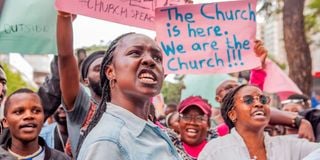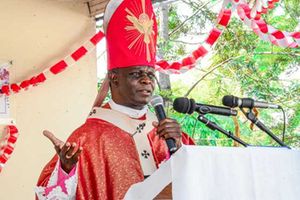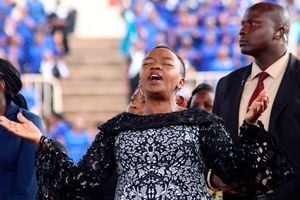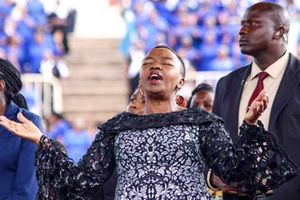
Youths from different churches during a peaceful demonstration along Kenyatta Avenue in Nairobi on Sunday last week.
There’s a popular joke doing the rounds that Gen Zs, in their anti-Finance Bill protests, have driven the Church back to God.
The clerics have been put on the spot as they struggle to confront accusations of being in bed with the State.
Amid intense pressure on the government to live up to its promises and address the high cost of living occasioned by heavy taxation on the people, the Church has found itself at crossroads and seems to be on an overdrive to reclaim its integrity and independence.
Over the past couple of days, the clergy has continued to call out the State over the brutality meted out on anti-tax protesters, a move seen as an attempt to endear the Church to the people after being on the receiving end for “cosying up to the government.”
President William Ruto has also been holding talks with a section of the clergy at State House in Nairobi, in a move aimed at pacifying the country amid rage by the young generation.
First Lady Rachel Ruto fell victim to the rage against the Church after the youth called out Lavington United Church, compelling its leadership to cancel a fundraising event that had been scheduled for yesterday.
Ms Ruto was slated to grace the event, which aimed to raise funds for the construction of a sanctuary.
Churches are now going an extra mile to assuage the public, with Christ is the Answer Ministries (Citam) claiming to have heeded “prophetic” calls by Gen Zs to bar politicians from the pulpit.
Prophetic call
Citam Presiding Bishop Calisto Odede said the rallying calls by the youthful protesters has pricked the conscience of the church to purge the pulpits of undue influence by politicians.
"Indeed, they truly showed us that, as the clergy, we should not politicise Christianity and neither should we Christianise politics. We the clergy have certainly listened to your prophetic call," he said in a statement on Sunday, June 30.
Some churches have also taken the initiative to provide safe havens for protesters in a bid to endear themselves to the public.
At the beginning of the protests, Jamia Mosque in Nairobi’s city centre was celebrated by the protesting youth after it established an emergency unit to take care of the injured during the demonstrations.
Last week, the All Saints Cathedral also allowed protesters into the church for refuge.
“During the protests and demonstrations that rocked the country on Tuesday 25th June 2024, All Saints Cathedral, Nairobi (ASC) opened the gates to over 3,000 protesters, majority of whom were Gen Z, to take refuge from furious police officers who were under orders not to allow any peaceful protest contrary to Article 37 of the Constitution.”
“We are sad that, despite seeking refuge in the House of God, police officers lobbed several tear gas canisters within the compound affecting several people,” Rev Canon Evans Omollo said in a statement yesterday.
He went on: “Later, that evening at 4.30pm, a contingent of military officers stormed the compound of ASC threatening everyone they found, ordering unarmed, peaceful youth to lie down and they shot live bullets indiscriminately in the compound. Spent cartridges used within the compound are in our custody.”
As the anger against the government continues, evangelical churches that had maintained studious silence have also emerged with criticism against the State.
A section of clergy led by Bishop Josephat Anusu yesterday took on Deputy President Rigathi Gachagua, accusing him of attacking “defenceless civil servants,” in the wake of the DP’s accusations against the director-general of the National Intelligence Service, Mr Noordin Haji.
“He (Mr Gachagua) should desist from shaming, ridiculing defenceless civil servants. Every citizen can see from the 18-yard line attempts to mask his gross mischief and disrespect to the President.”
“We do not know what drove him to make such remarks. Could there have been dirt intelligence on his plans to sabotage the very government he serves?” posed the clerics.
“As leaders, we are deeply dismayed by the Deputy President's public statements questioning the integrity and competence of constitutional office holders.”
On Saturday, President Ruto announced the constitution of a National Multi-Sectoral Forum (NMSF) that will constitute religious organisations among other stakeholders to engage in addressing the concerns raised by the youth (Gen Z generation) who have been the face of anti-government rage.
He said all national-level umbrella organisations representing the youth, civil society groups, religious organisations, professional bodies, business association, the academia, student leadership, majority and minority leaders of Parliament, the Council of Governors, and other stakeholder groups will nominate representatives to constitute the National Steering Committee (NSC) of the NMSF.
National Council of Churches of Kenya (NCCK) Patron Reverend Timothy Njoya, who is popular for speaking loudly against the autocracy and brutality of the then-President Daniel arap Moi in the 1980s and 90s, defended the move by the clergy to meet President Ruto, noting that it gave them an opportunity to “censure” him over the recent killings of protesters.
“We went to tell Ruto personally, rather than call a press conference that as far as we are concerned the State is dead.”
“We told him that the Executive has colonised Parliament which has now turned to be a faction of the Executive and has taken over the work of the legislature and he must address that as a matter of urgency,” Rev Njoya told the Nation.
He explained that the cleric reprimanded the President for allowing the State to take up the roles of Parliament and the Judiciary.
“Bishop David Kodia, on behalf of NCCK, told the President to his face to stop killing our children because they have a right to picket and protest.
“He said the President must stop deploying the military to deal with civilians and must henceforth rethink his military deployment to quell protests. He agreed to that but we are yet to see it happen,” added the clergy.
But even as he defended the State House visit, the Church continued to face a barrage of criticism for “being preoccupied with prayers to the ‘mighty’ while neglecting the families of victims of police brutality.”
Last Friday, a group of interdenominational pastors and members of the public gathered at the home of Molo MP Kuria Kimani to assess the damage after protesters invaded the compound during demonstrations against the Finance Bill.
The legislator, who is also the chairperson of the National Assembly Finance Committee, was not present and was said to be in Nairobi.
“It was not fair what the youths did to their MP,” said Bishop David Njoroge of Neema Lema Church.
Human rights activist Mercy Tarus said there is need to enact a “law that bars the Church from engaging in politics.”
“All churches should be audited by Kenya Revenue Authority and all their finances explained. There should be regulations that churches must fulfil to operate otherwise the Church will always be a tool for politicians to fool the masses,” she says.
Unlike Bishops Emeritus Henry Okullu, Alexander Muge, Ndingi Mwana a'Nzeki, David Gitari, Cardinal Otunga, Manasses Kuria and Timothy Njoya among other notable clerics who are celebrated for playing a significant role in the fight for social justice, human rights, and political reforms, the current Church has continued to face criticism from the public over its dalliance with the State.
Bishop Okullu of the Anglican Church of Kenya (ACK) was a known outspoken critic of authoritarianism and corruption in the Kenyan government and who used his position to call for greater democratic reforms and respect for human rights, often challenging the policies of the then-ruling party, Kanu.
Bishop Muge also of the ACK was a vocal critic of government corruption, human rights abuses, and social injustices in Kenya.
He highlighted the plight of the marginalised and oppressed, calling for accountability and transparency in governance.
Just as Bishops Okullu and Muge, Arch Bishop Ndingi of the Catholic Church and Gitari of the ACK were vocal advocates for social justice, human rights, and the dignity of Kenyans.
Machakos Deputy Governor Francis Mwangangi said the current crop of religious leaders should emulate their predecessors who stood for the oppressed in the society.
“The Church should stick to the truth and speak for the weak and stand by what is just. That is what we used to see many years ago. It is about standing by the truth on the side of the oppressed,” Mr Mwangangi said.
The Church, he noted, is the moral advocate in the society and must not side with “perceived oppressor.”
In a bid to reclaim its lost glory, the Church has embarked on an initiative to reposition itself as the voice of the people.
Azimio la Umoja One Kenya coalition Party leader Raila Odinga has in the past accused the Church of facilitating the laundering of money obtained unlawfully by corrupt politicians.
“The Church should be neutral in terms of political position. The church should not collude with politicians to sanitise their ill-gotten wealth,” Mr Odinga said.
Yesterday, Rev Canon Omollo outlined issues President Ruto should address in his meeting with the youth.
Austerity measures
“In order to restore the confidence of Kenyans in his leadership, we call on the President to listen to the people. The international community and those who surround the President seem not have the interest of this nation at heart. Gen Zs have just reminded our leaders that listening is one the greatest virtues in leadership,” the clergyman said in a statement.
He said the President must also outline practical austerity measures to reduce over-expenditure in government and let Kenyans see things changing from the use of lavish cars and over-representation in foreign trips.”
“Unnecessary and obnoxious per diems for civil servants, bloated staff in public service among others must stop. There is also need to scrap the illegal and unnecessary offices such as chief administrative secretaries and personal advisors which keep gobbling millions of shillings from public coffers.”
The ACK also called for the sacking of “incompetent and corrupt state officers beginning with Cabinet secretaries who have been adversely mentioned in corruption cases as well as those who have failed to offer honest and selfless advice.”
Rev Canon Omollo urged the Head of State to create a conducive environment for businesses by giving tax incentives to SMEs as a way of widening the tax bracket, which will result in increased revenue collection.







